Egypt has long been a famous travel destination. Touring the sights of Ancient Egypt is a thrilling experience, and the modern nation has a lot to offer, too. From ancient civilization to sprawling megacity, there is no shortage of excitement waiting.
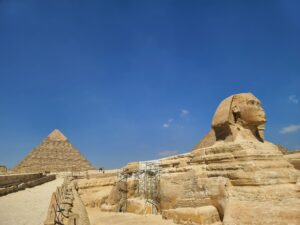
For many visitors, a trip to Egypt can also come with plenty of anxiety and uncertainty, which can easily lead to confusion and frustration. That is not something you want to detract from this fascinating place and the trip of a lifetime.
Exploring the land of pyramids and mummies should be every bit as memorable as you hope. The best way to ensure that you have the unforgettable trip you’ve always imagined is to go prepared.
Before traveling to Egypt, I spent a lot of time researching everything from safety and transportation to ticket prices and street food. I’m glad I did the research, but the best information is usually that which is acquired first hand. These travel tips for Egypt are taken from our personal experiences, research and learned lessons in the land of pharaohs.
Contents
1. Pre-Arrange Airport Transportation
Most tourists arrive in Egypt via plane, often after a lengthy flight. In our case, the outbound 36-hour journey consisted of three flights totaling about 20 hours in the air. The final leg was a dolorous 13 hours. Exhaustion was teetering on the verge of delirium.
Fortunately, I’ve boarded a fair few uncomfortable transcontinental flights. The last thing you want to do when you land is stress about how to reach your accommodation. Arrange it beforehand. It’s worth every penny.
Stressing about ground transportation, hoping that the Uber app works, haggling with taxi drivers and trusting that I’m not getting scammed – this isn’t something I’m willing to chance when I’m exhausted. Instead, I spent a few dollars more and arranged transportation before I left home. For a grand total of $25 ($17 + $8 tip), that is easily worth the reduction of stress and my peace of mind in a state of utter exhaustion.
There are many transport operators from which you can choose. We chose to book with 12Go, whom we have used all around the world: Cairo Airport Transportation
2. Don’t Forget to Tip!
Egypt has a notorious tipping culture, one even more serious than the asinine American tipping culture. And it goes double for tourists, perhaps literally. You are expected to tip.
Whether it’s a taxi, bellhop, waiter – if you are receiving anything remotely close to any kind of service, a tip is expected. Keep in mind, if you haven’t received any service, you don’t have to tip; however, what locals qualify as ‘service’ when it pertains to tourists has extremely liberal parameters.
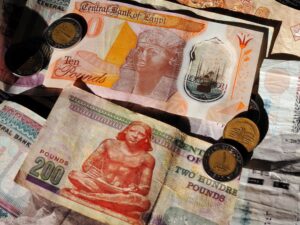
The word ‘baksheesh’ is the one that means tip. Many tourists who travel to Egypt report having this word screamed at them at some point or other. This was not our experience, but it’s a good word to know.
Most importantly! Don’t forget to tip your guides! While many who demand tips do not deserve it, official tour guides should not be lumped in with that bunch. Official tour guides in Egypt are held to high standards, provide excellent service and are deserving of something extra.
3. Keep Walking and Say “No”
Touts, vendors, merchants – whatever you want to call them, just say “No.” These people are outside (and often inside) every site of interest for tourists in Egypt, and they can sense weakness. Next thing you know, you’ll be trying to figure out how to pack the stuffed camel you now own or wondering how you squandered so much cash on an ordinary rock carved into a pyramid.
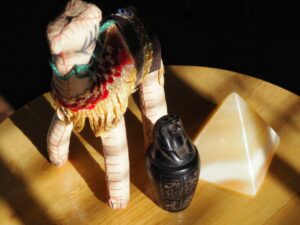
Try to avoid eye contact, too (unless you are genuinely interested in something). They are relentless in Egypt, albeit not as aggressive and sneaky as those I experienced in Morocco.
Regardless, be firm. If you don’t need something or don’t want to buy something, say “no” and keep walking. If a vendor persists aggressively or touches you, be firm. Don’t be afraid to raise your voice. And DO NOT feel guilty. This is something, in my opinion, that is unacceptable and simply poor business practice. The only reason they act this way is because it works enough on people who give in to their efforts.
On this note, this is something that Egypt’s tourist police and agencies need to fix. Tourists are willing to spend money, but this kind of behavior discourages many tourists from even stopping to consider making a purchase. Some people have such poor experiences they refuse to return to Egypt and encourage others not to visit at all.
If you know where you are going, don’t let someone try to lead you in another direction. In fact, no matter where you are, it’s probably best to not follow any overeager local you don’t know.
Our experience wasn’t traumatizing or anything like that, though we’ve prior experience with aggressive touts. Just be firm, say “no” or completely ignore them and keep walking.
4. Haggle
If you’re purchasing a souvenir, trinket, a camel ride – basically, if you’re purchasing any object or service that might fall into the ‘tourist’ realm – negotiate the price. Otherwise you’re getting ripped off, because that painting is not actually done by Muhammad Ali (yes, someone actually said this to me, and he specifically meant the boxer). And that little figurine is not ancient. It’s cool, sure, but it’s cheap and certainly not historic.
Make sure you negotiate. Once you get into it, it’s kind of fun, too.
5. Hire a Private Tour Guide
This may be the most important Egypt travel tip you come across. A tour guide in Egypt is a wonderful resource to have. Egyptian tour guides are far more than a person to lead you around the famous sites.
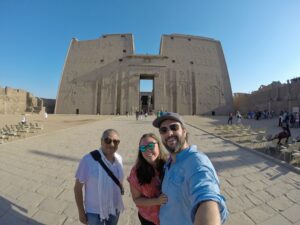
Official tour guides in Egypt are held to high standards. Their knowledge of history is extremely impressive. Beyond history, official tour guides can be a great resource for local advice and suggestions, and they will make your trip to Egypt significantly better and more manageable. This is an investment that is well worth it, especially for first-time visitors.
6. Don’t Drink the Water
Seriously, don’t take the chance. Buy bottled water. Look into those portable water filtering bottles if you can’t stand the plastic water bottles. I would prefer not to create the waste, too, but I’d rather just get over myself and also not have violent diarrhea.
It’s up to you, but I suggest buying bottled water for a few days. Plant a tree when you get home. Spend a day cleaning a beach. You’ll feel better about your wasteful travel footprint afterwards. You can pat yourself on the back, too.
Anyway, don’t drink the water. You’ll probably get sick.
7. Don’t Miss Out on Upper Egypt!
The Pyramids are cool and all. This is obvious. Ancient, famous, enormous, historically significant, mysterious – what more can one wish for in an historic attraction? It’s hard to imagine traveling to Egypt and skipping the Pyramids, so don’t do that. But…
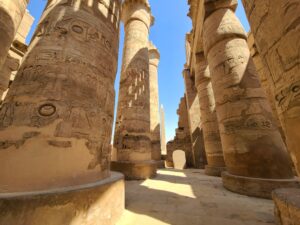
Upper Egypt is incredible. From Luxor and the Valley of the Kings to Aswan and Abu Simbel, Upper Egypt far exceeded my expectations. The scale of the structures, craftsmanship and detail on display for thousands of years is incomprehensible.
Don’t allot too many days in and around Giza. Seeing the Pyramids is certainly worth the trip. Once you go south, though, it quickly becomes apparent why Upper Egypt is so impressive. Be sure to include it in your itinerary.
8. Give Cairo a Chance
Too many tourists exit the plane, collect their baggage, exit Cairo International Airport and head straight for Giza and the Pyramids. Often, Cairo isn’t given much of a thought. It’s not quite what most people imagine, and certainly not what we expected.
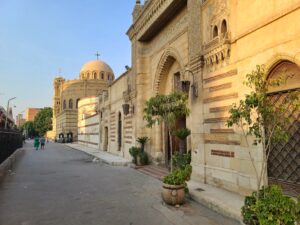
Despite the enormous city that exists today, Cairo has history, too. A lot. It’s well over 1000 years old and has been the cultural center of Egypt and an important city in the greater region for centuries.
History aside, it’s one of the largest cities in the world, home to over 20 million(!) people. That is something to see in itself. Oh, and there is some seriously great food in there, too. Most of the city is much cheaper than the tourist areas in which most visitors spend time.

As an added bonus, tourists are largely ignored in Cairo. Away from the museums and landmarks, we spent a few days wandering the streets of Cairo where no one bothered us at all. For these reasons and more, take a couple of days in Cairo to eat and explore.
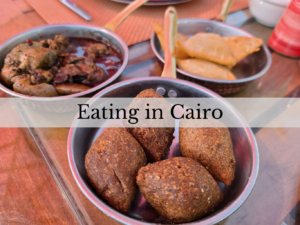
9. Take the Silly Tourist Photos
Time, money, courage (for some) – it takes a lot to travel all the way to Egypt. Forget when, you never know IF you’ll be back.
In addition to your stunning photography, take the silly photos, too. Friends and family might enjoy seeing it one day. Besides, everyone else, myself included, likely has the same great photos of the Sphinx or camels strolling by the Pyramids at sunset.

What I have that others do not are photos of myself. There is even be a cheesy pic or two. Years or decades from now, those pictures will probably more cherished than the ones where I was trying to be a NatGeo photographer.
10. Don’t Pay for Locals’ Tickets
You should not ever have to pay for your guide’s ticket. Legitimate, official guides in Egypt either do not have to pay for admission, have an annual pass or their tickets should be factored into their fees.
Ticket prices for Egyptians and Arabs are extremely cheap anyway, about one-tenth of the price that non-Arab tourists pay. Most Egyptian tour guides are excellent. They are knowledgeable, friendly, accommodating and trustworthy. If you have any doubt, make sure you know associated costs, i.e. entrance fees, for what you’re doing that day.
11. Keep Some Pocket Change on Hand
Sometimes, it’s the cost of doing your business. Even when you might assume use of a toilet is free, such as those at archaeological sites that you already paid to enter, that’s not necessarily the case.
Public toilets may charge a small fee. Or, the toilet may indeed be free, except for a bathroom attendant present who demands a tip. Call that ‘free’ if you wish…
12. Be Discreet with Your Cash
Egypt is generally a very safe place to travel. Tourists are a valued part of the economy. Thus, tourist safety is a high priority for law enforcement. However, the protection of tourists doesn’t extend to petty rackets. As its reputation accurately suggests, travel in Egypt regularly comes with scams. These can vary from small sums from “innocent” overcharging to hundreds of dollars for souvenirs.

Flashing or flaunting cash is unwise behavior in most places. The same goes for Egypt. Don’t make yourself a target for theft. Further, pulling out wads of money is a great way to ensure you are scammed or overcharged.
13. Beware of On-site Grifters
Don’t pay anyone inside any temple, tomb or other tourist site. If you’re past the entrance, you have already paid the necessary entrance fee. There is no other reason you should have to fork up more money.
Travel to Egypt comes with encountering touts and grifters. Somehow, every site in Egypt seems to come with people harassing tourists, hands out, asking for money, trying to sell you a piece of junk, telling you some likely-untrue tale or leading you to some “secret” spot. And they always demand a tip.
Tourists too often relent and pay the grifters to go away. Of course, this is ineffective. For one, this reinforces the behavior for the next group of tourist victims. Additionally, when you eventually pay an aggressive tout just to leave you alone, there is no guarantee they will.
The authorities rarely care about this. Hiring a guide is an excellent way to keep the touts and beggars at bay while also gaining access to tremendous information.
14. Don’t Pay Extra for a Guide at the Valley of the Kings
Guides are not allowed to accompany tourists into the tombs at the Valley of the Kings. Paying for a guide is really a waste of money. They are allowed to escort you as far as the entrance of each tomb but may not go in with you. The interior of tombs is unbelievably hot, and every additional person inside will only enhance the thickness of the air and increase the temperature.
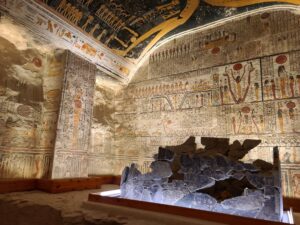
Egyptian guides are a tremendous resource, and a guide may possess a wealth of information. Fortunately, each tomb at the Valley of the Kings has a sign posted at the entrance with a lot of information about what lies inside.
If you already have a guide to lead you through Egypt, that’s fine. Let the guide make the trip to the Valley of the Kings easy, and take the suggestions for which tombs to visit. Otherwise, there is no need to hire a guide specifically for this part of your trip.
15. Skip King Tut’s Tomb
Unless you have plenty of time at the Valley of the Kings to see all of the open tombs – in this instance, ‘plenty of time’ means you plan to visit multiple days – prioritize other tombs over King Tut’s Tomb (KV62).
King Tut may be the most celebrated pharaoh today, but he wasn’t back then. His tomb is simply not as cool as the others. With a finite amount of time, more spectacular tombs at the Valley of the Kings are far more impressive and worth your sweat and time.
Check out our guide for the Valley of the Kings, Luxor Temple & Karnak!
16. Claustrophobes Beware!
If you are legitimately, severely claustrophobic, you may want to skip that visit to the Valley of the Kings. You will also want to exercise caution before agreeing to crawl into certain areas in Egypt.

I’m mildly claustrophobic. The mere idea of someone jokingly stuffing me in a trunk or zipping me in a sleeping bag makes me very uncomfortable. But those are very small spaces. I didn’t think twice about entering the tombs in the Valley of the Kings, but it may make some people fairly uncomfortable. The chambers open at the Pyramids and Saqqara are also rather small. There’s not much to see in there, but keep that in mind.
17. Be Observant of Others’ Clothing
From Mrs. Hangry Backpacker: It is important to be situationally observant about what others are wearing. What is acceptable to wear at the beach isn’t necessarily okay at the Valley of the Kings. You don’t want to stand out and attract any more unwanted attention than tourists already do.
18. Eat Local
Egyptian food is good, and the prices are super cheap. Apprehensive tourists have a tendency in places like Egypt to not eat beyond the confines of their hotel premises.
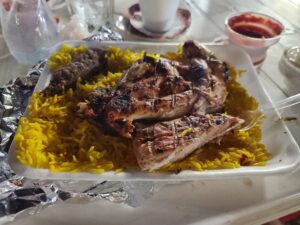
Don’t be afraid to seek out good, local Egyptian food. It’s not on the same level as Italy or Thailand, and that’s okay. While sampling the local cuisine may not be a big draw to visit Egypt, it’s a fun part of traveling anywhere. Venture out and take a bite. You might be surprised.
Surviving the Sahara Heat
Egypt is hot. I don’t care where you’re from, blistering desert sun and regular temperatures of 114°F (45°C) and hotter is brutal. That was the high in Luxor a couple of days while we were there, and it was not even the hottest time of year. This kind of heat takes a toll on anyone.
I’m from a place that regularly hits 100°F with humidity over 90%. I may be more accustomed to heat than others, especially when the air is dry. It hasn’t rained in Luxor in over 10 years. It doesn’t get much drier than that, but that Sahara desert heat is something else.
Dealing with the heat is crucial to helping you enjoy your travel in Egypt. It’s also important to protect yourself from these harsh elements. Utilize the following heat-related Egypt travel tips to help manage the Sahara environment:
18. Sunscreen
The sun is always out. And the desert sun is ruthless. Pack sunscreen. It can be expensive in Egypt when you can find it, and you probably want to ensure that you have a trustworthy or preferred brand anyway.
19. Bring a Hat
Make sure to pack a hat. One with a large brim is better. A good summer hat to protect your head, face and neck can do wonders to shield your skin from the sun, and it makes a tremendous difference in keeping you cooler.
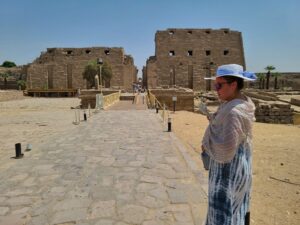
20. Pack Light-colored, Loose-fitting Clothing
High temperatures might have you consider packing a bag full of short shorts and tank tops. This isn’t the best idea. For one, it would be rather inconsiderate to walk around in skimpy clothes in much of Egypt. Muslim culture dominates. Although we saw many local women dressed in more Western fashion, I can’t recall seeing any pushing the limits very far. Within most hotels and resorts, this isn’t an issue.
Local custom aside, clothing choice is critical to manage the heat. Fabric that is lightweight and loose-fitting, such as light cotton or linen is a good choice. This dries quickly and a loose fit helps allow your skin to cool. Although it may seem counterintuitive, long sleeves (loose-fitting, of course) can actually keep you cooler than exposed skin.
Light colors are an obvious choice. You wouldn’t want to be wearing dark clothing that absorbs more light and heat while you’re out in the Egyptian sun.
21. Bring a Small Fan
A small, portable fan is typically something I would not suggest anyone pack on a trip. It’s usually a waste of space in a bag. In Egypt, however, a good little fan is a valuable thing to possess.

We visited museums that were not air-conditioned, and the stagnant air within really took its toll. There was also public transportation, which was pretty hot. On the Night Train from Cairo to Aswan, the air conditioning wasn’t the best. Even in the open air, a little extra breeze can help.
Your best bet is a small fan that is rechargeable, easily carried and easily stored in a day bag. Wearable neck fans are also good.
22. Sunglasses
Sunglasses seem like an obvious thing to pack. Personally, I brought two pairs with me, but I’m pretty particular about my shades.
A good pair of sunglasses that will protect your eyes from the sun is a necessity. Packing a second, cheap pair isn’t a bad idea. Seeing as Egypt is overwhelmingly desert, a bit of wind picking up can easily send a grain of sand toward your face. Nothing wrong with sunglasses doubling as a stylish bit of eye protection.
23. Hydrate!
The air of the Sahara desert is very hot and extremely dry. Sweat evaporates quickly in these conditions. Just because you may not feel that sweaty, you can still be losing a lot of fluid. Always have plenty of water on hand or nearby.
24. Don’t Forget Breakfast
Believe it or not, an empty stomach isn’t a great asset to possess before a day of touring open air archaeological sites in blistering heat and oppressive sun. Make sure to eat something in the morning. Don’t stuff yourself, but don’t set out on a totally empty stomach either.
25. Easy on the Booze
Limit the boozing before touring days. If you know you’re getting up the following morning to go tour an ancient temple, some ruins or whatever it may be, you don’t want to be dragging along in the Sahara heat with a hangover. Consider an easy night before days of exploring.
26. Seek Shade
Find shade. Take breaks.
If you’re like me, I get a bit excited in places like Egypt. There is so much to see, and it was so much more impressive than I imagined. My mentality is automatically ‘Go, go, go’ to see as much as possible.
I’m pretty heat tolerant. Even when the temperature was passing 110°F in the middle of the day, it didn’t slow me down. To be clear, I was always donning desert-friendly accouterments and drinking lots of water. Lucky for me, crowds are much thinner at the archaeological sites at this time.
Most people, however, are not this heat tolerant. Mrs. Hangry Backpacker, for instance, is nearly the opposite. She frequently needed to find bits of shade. Despite my tendency to keep exploring, I often forced myself to join her for my own safety. Desert heat can sneak up on you.
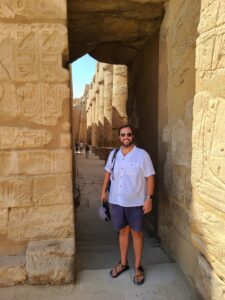
For safety reasons, don’t hesitate to take breaks in the shade. The reality of traveling to Egypt is that you can’t possibly see it all. Even in a lifetime. Don’t test the Sahara.
27. A Small Umbrella
This might seem a silly thing to take to Egypt. It doesn’t rain much there. In fact, some areas go years or decades between brief showers. But that midday sun is something you can count on showing up. Shade can be extremely scarce at this time. Trees are uncommon, too.
If you’re especially sensitive to the heat, bring a small umbrella. Every additional protection against the sun is a valuable thing to have.
With the right preparation and cache of travel tips, visiting Egypt can be the trip of a lifetime. For many tourists, simply getting there can be a tedious process. Making the most of your time and knowing what to expect is a great way to help ensure that the adventure runs as smoothly as possible.

Taking the time to research your destination is the best way to prepare for a place you’ve never been. There’s no substitute for being there in person, but acquiring information from first-hand sources is a great way to start your planning. Hopefully, these travel tips provide a little insight to what Egypt is like and what you may encounter. Above all, be observant, aware of your surroundings and have fun. Safe travels!
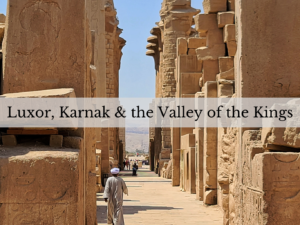
Leave a Reply
You must be logged in to post a comment.